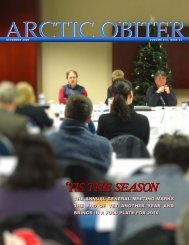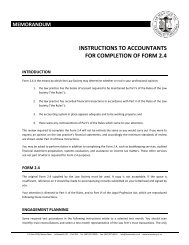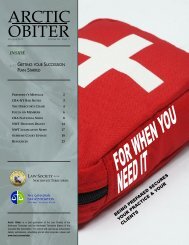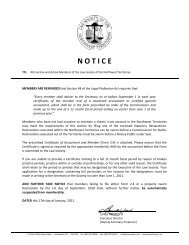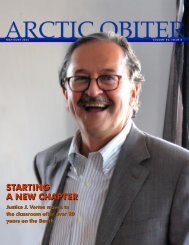ARCTIC OBITER
September/October 2011 - Law Society of the Northwest Territories
September/October 2011 - Law Society of the Northwest Territories
- No tags were found...
Create successful ePaper yourself
Turn your PDF publications into a flip-book with our unique Google optimized e-Paper software.
14 | <strong>ARCTIC</strong> <strong>OBITER</strong><br />
NWT DECISION DIGEST<br />
by Maureen McGuire, Appellate Counsel, Justice Alberta<br />
SUPREME COURT<br />
CIVIL PRACTICE AND PROCEDURE –<br />
APPLICATION TO STRIKE REPLY –<br />
RULE 112 OF THE RULES OF THE<br />
SUPREME COURT<br />
Anderson v Bell Mobility Inc.<br />
2011 NWTSC 40 (CanLII) | August 12, 2011<br />
Presiding: Justice R.S. Veale<br />
For the Applicant/Defendant: R. Deane<br />
For the Respondent/Plaintiffs: S. Marr<br />
The respondents are plaintiffs in a class<br />
action against the applicant, Bell<br />
Mobility Inc.<br />
The statement of claim<br />
alleged that Bell had breached contracts<br />
with the class members, and that Bell<br />
was unjustly enriched as a result of<br />
charging for 911 Emergency access not<br />
provided. In its statement of defence,<br />
Bell responded that 911 call processing<br />
and routing services are provided<br />
through the national network.<br />
The<br />
plaintiffs then filed a reply addressing<br />
that part of the statement of defence,<br />
stating that the 911 fees “vastly exceed<br />
the cost of creating and maintaining<br />
Defendant’s 911 call processing and<br />
routing services and national mobile<br />
wireless 911 network.” Bell brought an<br />
application under Rule 112, to strike the<br />
reply on the basis that it raised a new<br />
claim.<br />
Application dismissed<br />
– Unjust<br />
enrichment was pleaded in the<br />
statement of claim. The reply does not<br />
change that cause of action. The four<br />
purposes of a reply are: (a) to admit<br />
some of the facts alleged in the defence,<br />
or meet them by asserting new and<br />
additional facts; (b) to plead an<br />
objection in point of law; (c) to plead an<br />
answer to the defence that it mistakes<br />
the causes of actions; and (d) if the<br />
defendant has pleaded a counterclaim,<br />
to deal with the allegations of fact in the<br />
counterclaim. The ultimate function of<br />
pleadings is to clarify the issues of fact<br />
and law so that each party knows the<br />
case it has to meet before examinations<br />
for discovery and trial.<br />
CASES CITED<br />
CHS v Alberta, 2006 ABQB 528<br />
Mikisew Cree First Nation v Canada, 2004 ABCA<br />
279<br />
FAMILY LAW - CHILD CUSTODY -<br />
BEST INTERESTS OF CHILD<br />
Pilon v Pilon<br />
2011 NWTSC 41 (CanLII) | August 16, 2011<br />
Presiding: Justice V. Schuler<br />
For the Petitioner: D. Large<br />
For the Respondent: A. Duchene<br />
The mother applied to vary an order for<br />
joint and shared custody, seeking sole<br />
custody of the parties’ special needs<br />
child.<br />
Under the original order, the<br />
child spent alternate weeks with each<br />
parent.<br />
The father took the position<br />
joint custody was working, but if one<br />
parent was to have sole custody, it<br />
should be him.<br />
Application allowed in part - The fact<br />
that possible alienation of the mother<br />
was flagged as a concern in the expert<br />
evidence was sufficient to constitute a<br />
change in circumstance, permitting the<br />
court to review what is in the child’s<br />
best interests. There was evidence the<br />
transition between homes was difficult<br />
for the child. He would be better off<br />
with a regime with more consistency<br />
and stability.<br />
Therefore the court<br />
ordered the child spend alternate years<br />
with each parent, with the other parent<br />
having alternate weekends. However,<br />
joint custody was still appropriate.<br />
Because of the numerous disagreements<br />
between the parents regarding medical<br />
issues, ultimate authority to consent to<br />
medical treatment was given to the<br />
mother.<br />
CASES CITED<br />
R v Lavallee (1990), 55 CCC (3d) 97 (SCC)<br />
STATUTES CITED<br />
Children’s Law Act, S.N.W.T. 1997, c. 14<br />
CIVIL PROCEDURE - INJUNCTIONS<br />
Inuvik v Shattler<br />
2011 NWTSC 43 (CanLII) | September 6, 2011<br />
Presiding: Justice L. Charbonneau<br />
For the Petitioner: P. Smith<br />
The Respondent: Self-represented<br />
The town of Inuvik sought an injunction<br />
to prevent the respondent from his<br />
actions at a quarry. The town owns the<br />
quarry property, but the respondent,<br />
the holder of a mineral claim, also<br />
claims an interest in the land. Different<br />
statutes and regulations support each<br />
position. There is therefore a serious<br />
issue for trial. The demonstrated<br />
potential for the erosion of the<br />
municipal government’s ability to<br />
govern was a harm that could not be<br />
remedied by damages. While the<br />
respondent may be inconvenienced by<br />
an order requiring him to cease<br />
activities until the litigation is over, it<br />
would be open to him to seek<br />
compensation for damages later.<br />
Although the applicant met the test for<br />
an injunction, it was not necessary to<br />
completely forbid the respondent from<br />
accessing the site of his claim.<br />
Therefore it was ordered only that he<br />
refrain from certain specified activities<br />
on the site.<br />
CASES CITED



